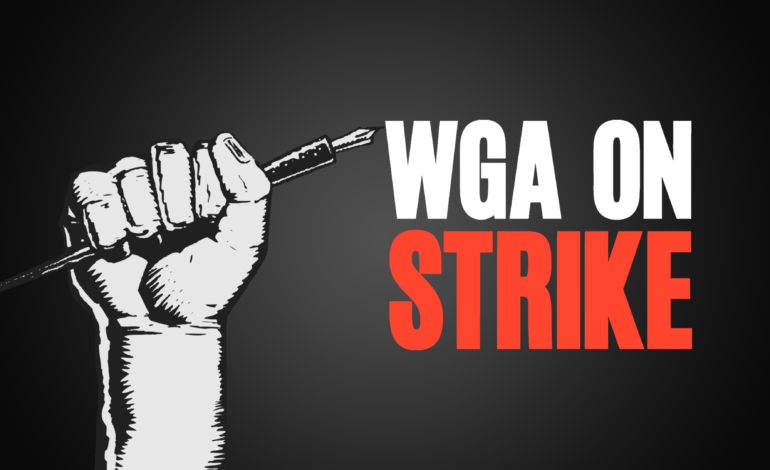

The Writer’s Guild of America is going on strike! Starting today, May 2nd, more than 11,500 television and screenwriters will go against the major studios. According to many sources such as the New York Times, the Los Angeles Times, the Hollywood Reporter, Deadline, and many others, this will affect many productions for a wide variety of shows.
Here is how this current strike happened and what will occur as a result.
The Board of Directors of the @WGAwest and the Council of the @WGAeast, acting upon the authority granted to them by their memberships, have voted unanimously to call a strike, effective 12:01 AM, Tuesday, May 2.
— Writers Guild of America West (@WGAWest) May 2, 2023
After many months of failed negotiations, the WGA made a statement three hours before 11:59 PM PT: “Following the unanimous recommendation of the WGA Negotiating Committee, the Board of Directors of the Writers Guild of America West (WGAW) and the Council of the Writers Guild of America, East (WGAE), acting upon the authority granted to them by their memberships, have voted unanimously to call a strike, effective 12:01 AM, Tuesday, May 2,” via Deadline.
From that same article, the impending results of the strike would put at risk 822,000 direct employees and 2.4 million total supporting jobs; $81 billion direct and $186 billion total supporting wages; and, $261 billion in sales for the market. This will especially affect over 11,500 direct members of the WGA and over 350+ production studios.
Seth Meyers (Late Night with Seth Meyers) on a potential WGA strike:
“I feel very strongly that what the writers are asking for is not unreasonable, and as a proud member of the Guild, I’m very grateful that there’s an organization that looks out for the best interests of writers.”pic.twitter.com/VZIuRjWxh6
— DiscussingFilm (@DiscussingFilm) May 2, 2023
According to Deadline, the WGA said in a statement: “The survival of writing as a profession is at stake in this negotiation. Driven in large part by the shift to streaming, writers are finding their work devalued in every part of the business. While company profits have remained high and spending on content has grown, writers are falling behind…The companies have used the transition to streaming to cut writer pay and separate writing from production, worsening working conditions for series writers at all levels.”
As reported by Deadline, the guild asked for 6%-5%-5% increases over the course of a new three-year contract for all minimums, which includes residual bases. But the guild says the AMPTP only offered 4%-3%-2% (a one-time increase to most residual bases of 2% or 2.5%). The WGA also wanted their members to have available jobs by getting more writers on set. Studios refer to this as “mandatory staffing” while the WGA calls this “preserving the writers’ room.”
Besides compensation, other problems brought forward by the WGA included writer’s rooms. According to The New York Times, writer’s rooms used to be implemented when a show was ordered to series after a pilot had been made. That would cost a studio millions of dollars to produce, and on top of that, spend even more to create a room with tens of writers to create episodes for a given show. With the rise of streaming, studios created and employed smaller mini-rooms that would be tasked to write for shows going straight-to-series. Netflix is famous for this tactic and only recently started to produce its first-ever pilot, Little Sky.
Another concern is the rise of AI to do the work for studios. According to The Hollywood Reporter, Open AI software has developed numerous algorithms to eventually give rise to Chat GPT and GPT4. That software demonstrated immense capabilities to do so much as write essays for schools and colleges. This is a major concern for the WGA as they seek to ensure safeguards for writers as the practice could question what is considered intellectual property and protected by copyright.
Let it be know that the #wga proposed: “Regulate use of artificial intelligence on MBA- covered projects: AI can’t write or rewrite literary material; can’t be used as source material; and MBA-covered material can’t be used to train AI.” and the studios rejected the proposal.
— Phillip Iscove (@pmiscove) May 2, 2023


Although the strike had officially started, the AMPTP made a statement suggesting that they are “willing to engage in discussions with the WGA in an effort to break this logjam,” via The Hollywood Reporter.
From that same article, the AMPTP affirms that it will, “remain united in their desire to reach a deal that is mutually beneficial to writers and the health and longevity of the industry, and to avoid hardship to the thousands of employees who depend upon the industry for their livelihoods.”
According to their own website wgacontract2023.org, the WGA provided a list of locations around the country where they would put on demonstrations. Their signs would read slogans such as “Scripts Don’t Grow on Trees!” and “The Future of Writing Is at Stake!” via The New York Times.
This week’s schedule will see picket lines go from 1:00pm-5:00pm on Tuesday, 9:00am-1:00pm. on Wednesday and 1-5 p.m. Thursday and Friday, via Deadline.
Members today at WGAW HQ in Los Angeles ✊ #WGAStrong pic.twitter.com/LOaLgZCgaS
— Writers Guild of America West (@WGAWest) April 27, 2023
Many people are speaking out about this strike. Mike Schur, the creator of The Good Place and co-creator of Parks and Recreation, said in an interview that when he was a young writer on The Office, he learned how to write a script, rewrite, edit, work with actors and became familiar with specialized crafts like set design and sound mixing.
“This is not stuff you can read in a book,” he said according to The New York Times. “This is stuff that you have to experience”,
Schur goes on to say, “These companies don’t understand what is coming down the pike. And what’s coming down the pike is an entire generation of show creators who might be super talented, who might have a lot to say about the world, but who functionally do not know how to do the job that they are going to be asked to do.”
Amanda Seyfried (The Dropout) spoke about the pending strike at the Met Gala in the video below.
Amanda Seyfried on the potential WGA strike: “My writer friends think it’s going to happen.” #MetGala https://t.co/OcPy5cjK1f pic.twitter.com/zkMT2aIqZU
— Variety (@Variety) May 2, 2023
The effects of the strike are already taking place. The New York Times reports the first shows to go are talk and sketch shows. Late-night shows like The Tonight Show Starring Jimmy Fallon, Jimmy Kimmel Live!, and The Late Show with Stephen Colbert will fail to provide new content due to the pace of their production. Daytime shows would be next, then Saturday Night Live, where Pete Davidson (Bupkis) is said to be this week’s host. The episode would have aired on May 6th. The impending shutdown would also cut short its season finale. Since all of these shows occur weekly, the strike would be felt more immediately. As a result, many reality tv shows and more foreign-based shows will be aired and promoted in heavy rotation.
Jimmy Fallon on the potential writers strike: “I wouldn’t have a show if it wasn’t for my writers, and I support them all the way.” https://t.co/m94XaFKHbE pic.twitter.com/oKLq4GrgkR
— Variety (@Variety) May 2, 2023
According to Deadline, broadcasting companies have been putting emphasis on live shows, sports programs, and unscripted fare. For example, Fox finished as fall’s No.1 broadcast network among adults in the 18-49 for the first time in a decade. This is followed by The Masked Singer, Thursday Night Football, the World Series and WWE Smackdown. This resulted in Fox’s schedule being taken up 40% of the time allocated for sports/reality programs.
Furthermore, for the companies, they suggest there is more than just pay that they are dealing with. Disney is in the middle of laying off over 7,000 employees, Warner Bros. Discovery laid off thousands of workers and shelved many titles last year. Turns out it has been trying to pay a debt of around $50 billion to creditors, $30 Billion of which was from Discovery’s debt before the merger.
From The New York Times, the co-chief executive of Netflix, Ted Sarandos, suggested two weeks ago that they would be able to come out of this due to how many foreign and international films and tv shows it has in distribution. He adds that compared to Netflix’s competitors, “We could probably serve our members better than most…The last time there was a strike, it was devastating to creators…It was really hard in the industry. It was painful for local economies that support production and it was very, very, very bad for fans.”
For many, this strike will mark another turning point in entertainment, and the process will be hard for those directly invested. Concerns about labor and restructuring caused a 35.8% plunge in on-location TV production in Los Angeles in the first quarter of 2023 compared to Q1 of 2022, via Deadline.
That same article cites how the Motion Picture Association (MPAA) had a combined 2.4 million people work in jobs supported by the entertainment and media industry, which pays over $186 billion in wages annually. This is only in L.A. Overall, the U.S. entertainment industry pays $21 billion per year to more than 260,000 businesses nationally per the MPA. This accounts for $14.4 billion in exports and $7 billion in trade surplus for the country. A strike could lead to a fall in media exports to foreign markets.
As for the members of the WGA, they are not alone. Other unions also have contracts with the AMPTP that are due to expire in a few weeks. Some of its allies include SAG-AFTRA, DGA, IATSE, Hollywood’s Teamsters Local 399, the American Federation of Musicians, and even the UK Writer’s Guild., via Deadline.
Teamsters Local 399 brass made a statement saying: “These multibillion-dollar corporations – including Amazon, Netflix, Disney, and Apple – invest in highly paid executives and lavish productions…They can afford to share the wealth with the writers who create the content we all watch. We are monitoring negotiations closely. This is a shared fight and Teamsters do not cross picket lines,” via Deadline.
SAG-AFTRA made an official statement saying: “SAG-AFTRA stands strongly in support and solidarity with the members of the Writers Guild of America who are engaged in contract negotiations with the Alliance of Motion Picture and Television Producers. It is long past time for the studios, streamers, and other employers in the entertainment industry to remove roadblocks to fair and equitable wages and working conditions, and to agree to terms that reflect the unique worth and contribution of creative talent and workers, without whom the industry would not exist.”
